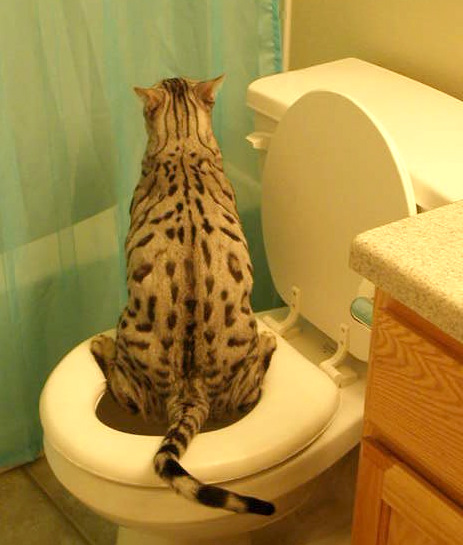Dangers of Disposing Cat Poop in Your Toilet - Precautionary Measures
Dangers of Disposing Cat Poop in Your Toilet - Precautionary Measures
Blog Article
Just how do you really feel in regards to Can You Flush Cat Poo or Litter Down the Toilet??

Introduction
As feline owners, it's necessary to be mindful of how we get rid of our feline pals' waste. While it may appear practical to flush cat poop down the commode, this technique can have damaging repercussions for both the atmosphere and human wellness.
Alternatives to Flushing
Fortunately, there are more secure and extra responsible means to throw away cat poop. Take into consideration the adhering to options:
1. Scoop and Dispose in Trash
The most usual approach of disposing of feline poop is to scoop it right into an eco-friendly bag and throw it in the trash. Be sure to utilize a dedicated litter scoop and dispose of the waste quickly.
2. Usage Biodegradable Litter
Go with biodegradable feline trash made from products such as corn or wheat. These clutters are environmentally friendly and can be securely disposed of in the trash.
3. Bury in the Yard
If you have a lawn, think about hiding feline waste in a designated area away from vegetable gardens and water sources. Be sure to dig deep enough to avoid contamination of groundwater.
4. Set Up a Pet Waste Disposal System
Purchase a family pet garbage disposal system particularly developed for cat waste. These systems use enzymes to break down the waste, reducing smell and ecological effect.
Health and wellness Risks
In addition to ecological problems, flushing cat waste can also pose wellness dangers to humans. Pet cat feces may contain Toxoplasma gondii, a bloodsucker that can cause toxoplasmosis-- a possibly severe health problem, particularly for expecting females and people with damaged immune systems.
Environmental Impact
Purging cat poop presents hazardous pathogens and parasites right into the supply of water, posturing a significant danger to marine environments. These impurities can negatively affect aquatic life and concession water top quality.
Verdict
Liable pet dog ownership expands beyond giving food and sanctuary-- it additionally includes correct waste administration. By avoiding flushing pet cat poop down the commode and going with different disposal techniques, we can reduce our ecological footprint and secure human wellness.
Why Can’t I Flush Cat Poop?
It Spreads a Parasite
Cats are frequently infected with a parasite called toxoplasma gondii. The parasite causes an infection called toxoplasmosis. It is usually harmless to cats. The parasite only uses cat poop as a host for its eggs. Otherwise, the cat’s immune system usually keeps the infection at low enough levels to maintain its own health. But it does not stop the develop of eggs. These eggs are tiny and surprisingly tough. They may survive for a year before they begin to grow. But that’s the problem.
Our wastewater system is not designed to deal with toxoplasmosis eggs. Instead, most eggs will flush from your toilet into sewers and wastewater management plants. After the sewage is treated for many other harmful things in it, it is typically released into local rivers, lakes, or oceans. Here, the toxoplasmosis eggs can find new hosts, including starfish, crabs, otters, and many other wildlife. For many, this is a significant risk to their health. Toxoplasmosis can also end up infecting water sources that are important for agriculture, which means our deer, pigs, and sheep can get infected too.
Is There Risk to Humans?
There can be a risk to human life from flushing cat poop down the toilet. If you do so, the parasites from your cat’s poop can end up in shellfish, game animals, or livestock. If this meat is then served raw or undercooked, the people who eat it can get sick.
In fact, according to the CDC, 40 million people in the United States are infected with toxoplasma gondii. They get it from exposure to infected seafood, or from some kind of cat poop contamination, like drinking from a stream that is contaminated or touching anything that has come into contact with cat poop. That includes just cleaning a cat litter box.
Most people who get infected with these parasites will not develop any symptoms. However, for pregnant women or for those with compromised immune systems, the parasite can cause severe health problems.
How to Handle Cat Poop
The best way to handle cat poop is actually to clean the box more often. The eggs that the parasite sheds will not become active until one to five days after the cat poops. That means that if you clean daily, you’re much less likely to come into direct contact with infectious eggs.
That said, always dispose of cat poop in the garbage and not down the toilet. Wash your hands before and after you clean the litter box, and bring the bag of poop right outside to your garbage bins.
https://trenchlesssolutionsusa.com/why-cant-i-flush-cat-poop/

As a person who reads about How to Dispose of Cat Poop and Litter Without Plastic Bags, I think sharing that excerpt was really useful. If you please take the opportunity to distribute this article if you liked it. Kudos for your time. Don't forget to visit our website back soon.
View Website Report this page